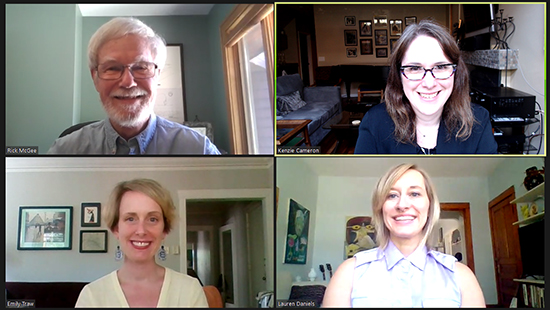Why Mentoring Through Crises Does Not Need to Put Mentorship in Crisis
NUCATS-supported publication shows how a realignment of expectations benefits mentors, mentees
In a time of global pandemic and social unrest, a team of Northwestern University researchers has published a unique commentary on important considerations for mentoring during a crisis.
Mentorship is seen as a critical component in academia, described both as a responsibility of faculty and a catalyst for career success, the authors wrote in in the Journal of Clinical and Translational Science.
“Mentoring can take many forms: face-to-face, a phone call, via zoom, formally, informally, frequently or infrequently, and the decision is often based on need. The important thing to remember now is to continue to build the relationship in whatever capacity is possible,” says lead author Kenzie Cameron, PhD, MPH, research professor of Medicine (General Internal Medicine and Geriatrics), Medical Education, Medical Social Sciences and Preventive Medicine. “Acknowledging that it’s different to not be sitting in the same room promotes an adjustment in our own expectations, styles and availability, and leads to a mentorship model where multiple communication channels may be necessary for professional growth.”
Respected leaders in the study of mentorship and career development, the authors included Cameron, director of the Northwestern University Clinical and Translational Sciences (NUCATS) Institute’s Mentoring Programs within the Center for Education and Career Development (CECD); Lauren Daniels, BS, NUCATS CECD senior program coordinator; Emily Traw, MS, assistant director of the CECD; and Rick McGee, PhD, associate dean for Professional Development, professor of Medical Education and director of the NUCATS Institute’s Navigating the Research Enterprise Program and Taking Responsibility for the Responsible Conduct of Research training.
The COVID-19 pandemic and social unrest that continue to grip the nation has altered many mentoring relationships, often changing the frequency or duration of interactions. For mentorship to remain valuable, the authors suggest mentors and mentees recognize the world in crisis, validate shifting professional and personal roles and responsibilities, acknowledge grief, practice compassion, and, most importantly, be ready to realign mentorship expectations.

Lauren Daniels, BS; and Emily Traw, MS
Cameron, Daniels, and Traw began writing the paper in early April, and were joined by McGee soon after. In the days between submitting a first draft and resubmitting a second draft, the social fabric of the nation began to tear after the death of George Floyd.
“Our world was again very different from what it was a week earlier, and as students, scientists and clinicians reprioritized their lives, we recognized that if mentorship did not remain a priority, some relationships could easily be weakened, if not lost,” says Cameron. “Early on, we acknowledged the loss of the informal mentoring that occurs when someone goes out to lunch with someone else, or ‘pops by’ for a quick question, or sees someone in the elevator and picks their brain. Given our physical and social distance, such informal check ins are no longer happening and we believe that mentoring itself may take either more, or at the least, different types, of effort.”
As the reactivation of work spaces begins, the authors suggest mentors keep in mind the iterative nature of mentorship in this new normal. As leaders, the authors specifically task mentors with:
- Acknowledging the importance of and need for reassessing goals and expectations
- Making time and space to engage in conversations with mentees
- Starting the conversation, then listening carefully
- Being open and honest with mentees
- Remaining aware of the cultural differences and similarities between mentors and mentees
“Many of our colleagues experienced conflicting advice as they tried to figure out how to work and parent and mentor and teach their children from home,” says Cameron. “As we moved this paper along, we continued to reframe it, adding our team’s perspectives on what action steps mentors should be considering in a time of global pandemic and social activism.”
The publication, “Mentoring in crisis does not need to put mentorship in crisis: realigning expectations,” was supported, in part, by the National Institutes of Health's National Center for Advancing Translational Sciences, Grant Number UL1TR001422.




